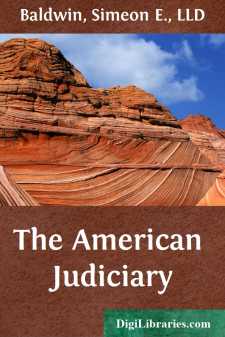Categories
- Antiques & Collectibles 13
- Architecture 36
- Art 48
- Bibles 22
- Biography & Autobiography 813
- Body, Mind & Spirit 142
- Business & Economics 28
- Children's Books 16
- Children's Fiction 13
- Computers 4
- Cooking 94
- Crafts & Hobbies 4
- Drama 346
- Education 46
- Family & Relationships 57
- Fiction 11829
- Games 19
- Gardening 17
- Health & Fitness 34
- History 1377
- House & Home 1
- Humor 147
- Juvenile Fiction 1873
- Juvenile Nonfiction 202
- Language Arts & Disciplines 88
- Law 16
- Literary Collections 686
- Literary Criticism 179
- Mathematics 13
- Medical 41
- Music 40
- Nature 179
- Non-Classifiable 1768
- Performing Arts 7
- Periodicals 1453
- Philosophy 64
- Photography 2
- Poetry 896
- Political Science 203
- Psychology 42
- Reference 154
- Religion 513
- Science 126
- Self-Help 84
- Social Science 81
- Sports & Recreation 34
- Study Aids 3
- Technology & Engineering 59
- Transportation 23
- Travel 463
- True Crime 29
The American Judiciary
Description:
Excerpt
CHAPTER I
ENGLISH ORIGIN AND EARLY DEVELOPMENT OF THE AMERICAN JUDICIARY
No government can live and flourish without having as part of its system of administration of civil affairs some permanent human force, invested with acknowledged and supreme authority, and always in a position to exercise it promptly and efficiently, in case of need, on any proper call. It must be permanent in its character. Only what is permanent will have the confidence of the people. It must always be ready to act on the instant. The unexpected is continually happening, and it is emergencies that put governments to the test.
The judiciary holds this position in the United States. The institutions which underlie and characterize it, both of the United States and of each of the States, considered by itself,[Footnote: I do not except Louisiana, for trial by jury and other institutions derived from the common law have profoundly affected her whole judicial system.] are the outgrowth of those of the thirteen English colonies on the Atlantic coast, which declared their independence in 1776.
The colonial charters, whether of the proprietary, provincial or republican type, were all equally charters for Englishmen, based on the common law of the English people. So far as they granted legislative power, it was generally declared that it should be exercised in conformity, so far as might be practicable, with the laws of England. The proviso to this effect in the roving patent given by Queen Elizabeth to Sir Walter Raleigh may be taken as a type: "so always as the said statutes, lawes, and ordinances may be, as neere as conveniently may be, agreeable to the forme of the lawes, statutes, government, or pollicie of England."[Footnote: Poore, "Charters and Constitutions," II, 1381.]
In the Southern New England colonies, when first settled, the common law of England was disowned. They made the little law which they needed for themselves, and as cases which this might not provide for arose, they were to be decided by such rules as the magistrates might think right and warranted by the precepts found in the Bible. Connecticut continued to insist on this view, with general consistency, until the days of the Stamp Act, when it became the interest of her people to claim the benefit of the principles of the English constitution and of the common law, on which it was built up.[Footnote: Colonial Records of Conn., 1689-1706, 261; Conn. Stat., ed. of 1769, 1. Cf. citations by D. Davenport, arguendo, in Flynn v. Morgan, 55 Connecticut Reports, 132-134, from MSS. in the State archives.]
In early Massachusetts the written pleadings often referred to the Bible, quoting a text from it as an authority, just as citations now might be made in a lawyer's brief from a legal treatise or reported case.[Footnote: Publications of the Colonial Society of Mass., III, 324.]
As was anticipated in the Raleigh patent, it was found from the first and everywhere that if the common law was to be applied to the rough conditions of colonial life some modifications were necessary....


